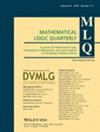多可选推理集的切条件
IF 0.4
4区 数学
Q4 LOGIC
引用次数: 0
摘要
在一些弱集合论的假设下,我证明布尔素数理想定理等价于我称之为公式切到集合切定理:对于一个集合F和一个二元关系∑P (F)$ \mathcal {P}(F)$,如果它是有限的,单调的,并且满足公式的切,那么它也满足集合的切。我两次从超滤定理推导出CF/CS定理;每个证明都使用了tukey - teichm本文章由计算机程序翻译,如有差异,请以英文原文为准。
Cut-conditions on sets of multiple-alternative inferences
I prove that the Boolean Prime Ideal Theorem is equivalent, under some weak set-theoretic assumptions, to what I will call the Cut-for-Formulas to Cut-for-Sets Theorem: for a set F and a binary relation ⊢ on , if ⊢ is finitary, monotonic, and satisfies cut for formulas, then it also satisfies cut for sets. I deduce the CF/CS Theorem from the Ultrafilter Theorem twice; each proof uses a different order-theoretic variant of the Tukey-Teichmüller Lemma. I then discuss relationships between various cut-conditions in the absence of finitariness or of monotonicity.
求助全文
通过发布文献求助,成功后即可免费获取论文全文。
去求助
来源期刊
CiteScore
0.60
自引率
0.00%
发文量
49
审稿时长
>12 weeks
期刊介绍:
Mathematical Logic Quarterly publishes original contributions on mathematical logic and foundations of mathematics and related areas, such as general logic, model theory, recursion theory, set theory, proof theory and constructive mathematics, algebraic logic, nonstandard models, and logical aspects of theoretical computer science.

 求助内容:
求助内容: 应助结果提醒方式:
应助结果提醒方式:


